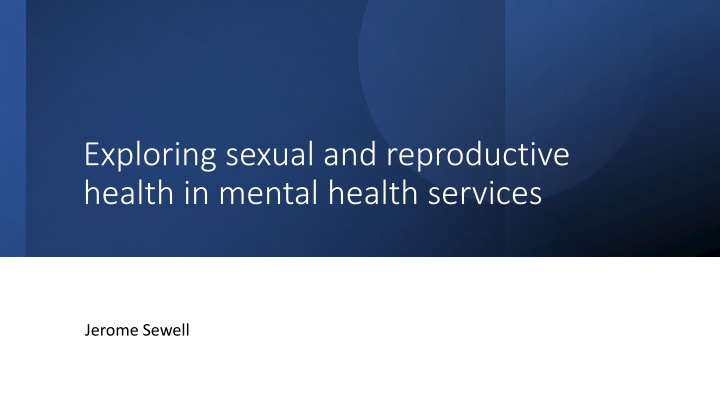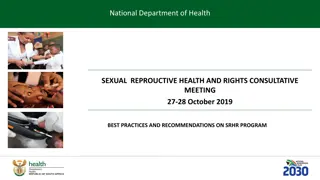
Exploring Sexual and Reproductive Health in Mental Health Services
Discover the importance of addressing sexual and reproductive needs in mental health services, focusing on challenges faced by patients. Explore strategies to enable constructive conversations and promote the use of sexual clinics to better serve service users.
Download Presentation

Please find below an Image/Link to download the presentation.
The content on the website is provided AS IS for your information and personal use only. It may not be sold, licensed, or shared on other websites without obtaining consent from the author. If you encounter any issues during the download, it is possible that the publisher has removed the file from their server.
You are allowed to download the files provided on this website for personal or commercial use, subject to the condition that they are used lawfully. All files are the property of their respective owners.
The content on the website is provided AS IS for your information and personal use only. It may not be sold, licensed, or shared on other websites without obtaining consent from the author.
E N D
Presentation Transcript
Exploring sexual and reproductive health in mental health services Jerome Sewell
1. Introduction 2. Key challenges 3. How do we enable constructive conversations around sexual and reproductive health? 4. How do we promote the use of sexual clinics? Content
The subject of sexual and reproductive needs regarding mental heath service users and particularly in secure mental services is often overlooked but is an important topic that is essential to proving for basic human needs. In this presentation I aim to explore and encourage new ideas of how to engage with this with a particular emphasis on assisting the service of sexual clinics to better serve the needs of service users. Introduction
Key challenges There are a number of key challenges patients face when it comes to having their sexual and reproductive needs met. These include but are not limited to:
1.The length of time people spend without having intimate relationships. Patients on forensic wards in particular face the particular obstacle of spending a long time in hospitalization, this has a unique impact on their relationships and perspective on intimate relationships.
2. Lack of intimacy and in touch with emotions. Hospitalisation can lead to a lack of opportunity to engage in intimacy and stay in touch with emotions, some people may find it hard to engage with conversations around their feelings which can be compounded by a lack of ability to stay in touch with their emotional side.
3. Lack of knowledge over the implications of getting either a sexual disease or impregnating someone. Long stays in hospital may heighten sexual cravings and these natural desires which come as a result of an unnatural withholding of natural instincts may cause behaviours that are not thought through including such as a lack of responsible sexual behaviour.
4. Lack of understanding regarding the safe use of leave Leave or the process of facilitating engagement with the community can predictably lead to patients resuming the natural course of engaging in sexual relationships, especially when leave is unescorted as sexual intercourse is more accessible.
5. Effects of medication on sexual organs. For some service users they may experience side effects from medication which include effects on their libido.
How do we enable constructive conversations around sexual and reproductive health? The structures of forensic wards are different but there are methods of encouraging dialogue about sexuality. For example: 1. Exploring sexuality through creativity: the use of creative exercises such as writing, music and sculpting. 2. Acknowledging and explaining the issue and reason for denial of communal visits. 3. Use of peer mentors
How do we enable constructive conversations around sexual and reproductive health? 4. Having a constructive conversation in private sessions as one on ones. 5.Identifying staff people have respect for and good relationships with. 6. Providing more facilitates or sexual health i.e. condom machines and advertising them 7. The use of pharmacists and explanation of biological symptoms.
How do we promote the use of sexual clinics? Services that involve sexuality often require the creation of a space that feels safe, is trusted and does not feel intrusive. This can be difficult given patient s feelings about in patient wards but there are ways this can be achieved:
1. Use of peer mentors and trusted staff 2. Creating a welcoming environment with the use of free spaces. 3. Lower rate of community supervision. 4. Recovery college courses 5. Use of guest speakers outside of the hospital setting How do we promote the use of sexual clinics?






















